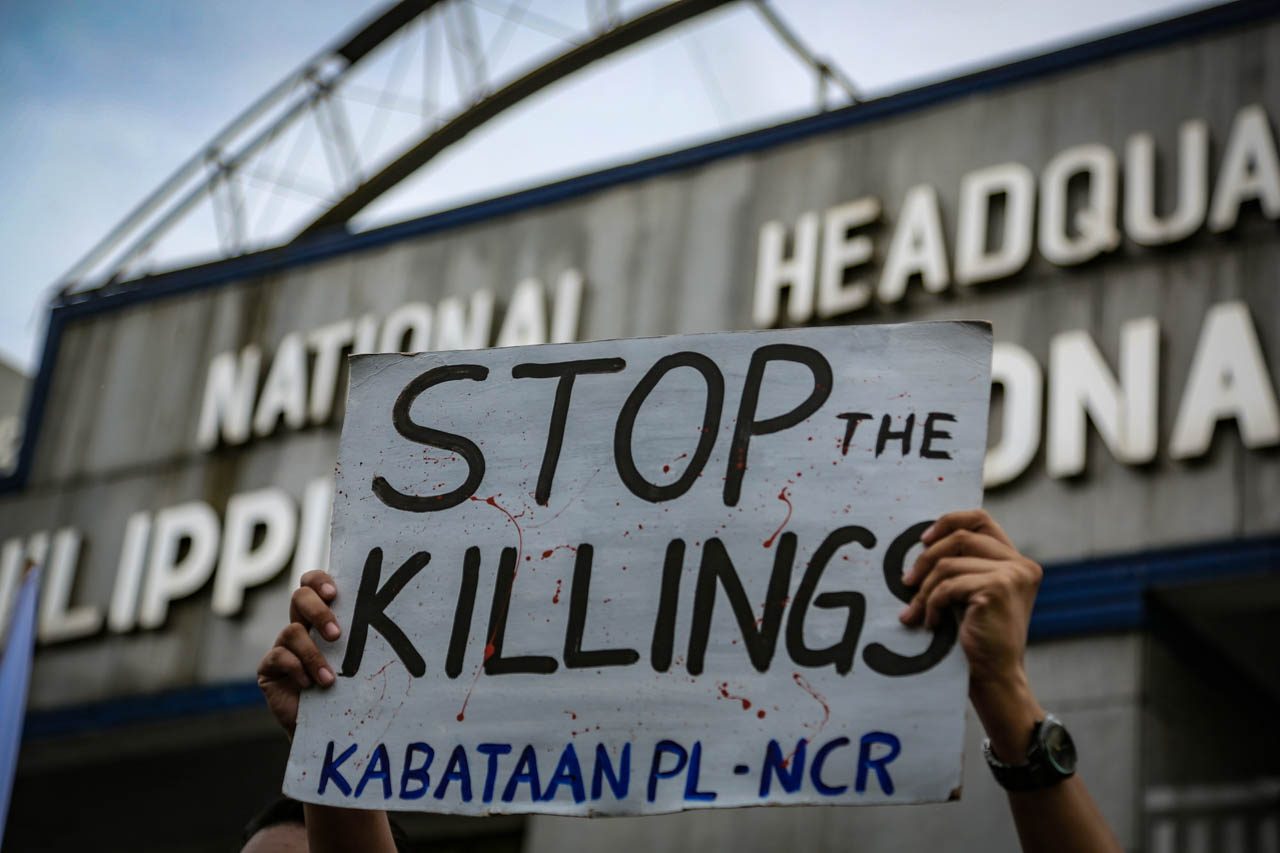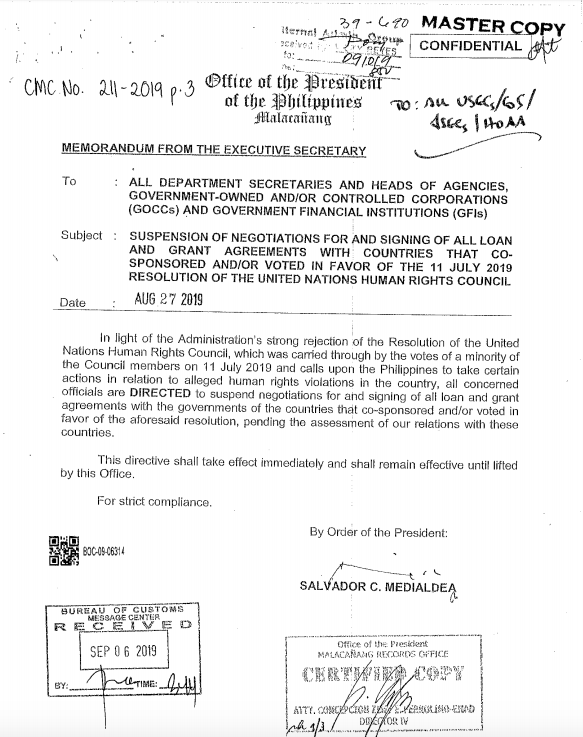SUMMARY
This is AI generated summarization, which may have errors. For context, always refer to the full article.


MANILA, Philippines (3rd UPDATE) – Malacañang has ordered all departments and other government agencies to suspend negotiations for loans and grants from countries that voted in favor of a United Nations Human Rights Council (UNHRC) resolution to look into the Duterte administration’s campaign against illegal drugs.
The “confidential” memorandum, first reported by Inquirer, was signed by Executive Secretary Salvador Medialdea on August 27, 2019.
A copy was posted on the Bureau of Customs website as an attachment to Customs Memorandum Circular 211-2019, dated September 11.

“In light of the Administration’s strong rejection of the Resolution of the United Nations Human Rights Council, which was carried through by the votes of a minority of the Council members on 11 July 2019 and calls upon the Philippines to take certain actions in relation to alleged human rights violations in the country all concerned officials are DIRECTED to suspend negotiations for and signing of all loan and grant agreements with the governments of the countries that co-sponsored and/or voted in favor of the aforesaid resolution, pending the assessment of our relations with these countries,” read the Office of the President (OP) memo.
In total, 18 countries voted in support of the resolution which was proposed by Iceland: Argentina, Australia, Austria, Bahamas, Bulgaria, Croatia, Czech Republic, Denmark, Fiji, Iceland, Italy, Mexico, Peru, Slovakia, Spain, Ukraine, the United Kingdom, and Uruguay.
Since the memorandum only covers loans and grants still being negotiated or about to be signed, signed agreements are not affected.
Malacañang denial. Yet Presidential Spokesman Salvador Panelo categorically denied the issuance of the memo on Friday, September 20.
“The President has not issued any memorandum suspending loans and negotiations involving 18 countries that voted in favor of the Iceland resolution,” Panelo said in a message to reporters.
He also said he had personally spoken with Duterte to confirm whether or not he issued such a memo.
The document on the BOC website said it was signed by Medialdea “by Order of the President.”
Medialdea and Finance Secretary Carlos Dominguez III had not responded to Rappler’s queries about the matter. Another attachment to the Customs circular was an OP letter to Dominguez dated September 3, informing him about the Palace memo.
Socieconomic Planning Secretary Ernesto Pernia said he could not confirm the existence of the order, while Trade Secretary Ramon Lopez said he had not seen a copy of the document.
In tweets on Friday and Saturday, Foreign Secretary Teodoro Locsin Jr called the OP memo a “good move,” as the amount involved was “small” anyway. Senators and human rights advocates slammed the move.
What’s the UN resolution about? It’s no secret that Duterte was outraged by the UNHRC resolution adopted last July 11.
Proposed by Iceland, the resolution asked UN rights chief Michelle Bachelet to write a comprehensive report on the situation in the Philippines and present it to the council.
The resolution also urged the Philippine government to “take all necessary measures to prevent extrajudicial killings and enforced disappearances, to carry out impartial investigations and to hold perpetrators accountable, in accordance with international norms and standards, including on due process and the rule of law.”
Out of the UNHRC’s 47 member-countries, 18 voted to adopt the resolution, 14 opposed it, while 15 abstained.
In response, Duterte publicly mocked Iceland and mulled cutting diplomatic ties with it.
On July 11, Foreign Secretary Teodoro Locsin Jr threatened the governments who supported the Iceland resolution with “far-reaching consequences.” Exacly two months later, on September 11, Locsin said in an ANC interview that had “forgiven” Iceland for what he called its “nothing resolution.”
It’s not the first time Malacañang rejected assistance from countries it perceived as “interfering” with the crackdown on illegal drugs.
In 2018, the Philippines rejected P380 million in European Union aid. In 2017, the developing country refused to accept more EU grants, pegged at around 250 million euros or P13.85 billion.
Here is Customs MC 211-2019 and its attached documents, as uploaded on the Customs website:
– Rappler.com
Add a comment
How does this make you feel?
There are no comments yet. Add your comment to start the conversation.